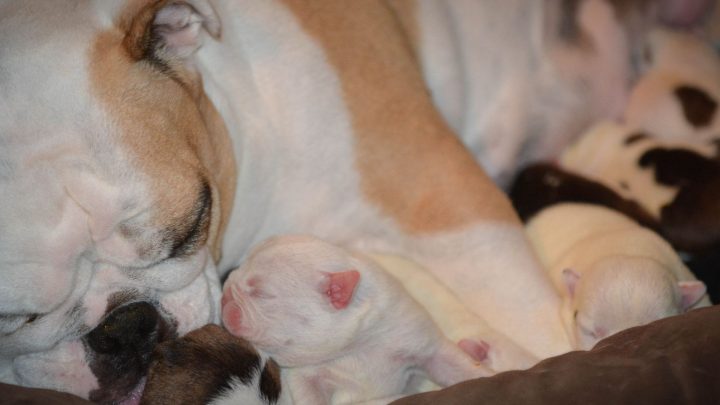It can be super exciting when you know that your dog has puppies on the way. Or maybe your female dog just had pups! This situation can also be a bit of a stressful time. If the mother dog doesn’t produce milk, it can be tough to know what you need to do. This is your complete guide on how to best cope with situations like this and how to even prevent any complications through early intervention. Keep reading to find out more!

Table of Contents
- What To Feed A Dog After Giving Birth?
- Water Alternatives for Increasing A Nursing Dog’s Milk Production
- Foods That Help With Nursing Dog’s Milk Production
- Lack of Lactation For Nursing Dogs – Other Causes
- What To Feed A Nursing Dog for Milk Production – Answered!
- What To Feed A Nursing Dog To Increase Milk – FAQs
What To Feed A Dog After Giving Birth?
Water is an essential resource which all mammalian creatures need in order to produce milk. And without it, they can become dehydrated very quickly. This is the first thing you should ensure your dog has as this is an absolute priority in making sure your dog can produce milk.
Dehydration is the first step to quickly slowing down or can even stop milk production. Make sure that your dog producing milk always has a nearby water source.
If your dog has a litter, then make sure that at all times she has a source of water in her cage. Do not let the water level within her cage go less than halfway. It is likely she will use up a lot of water whenever she does go for a drink.
In the early stages, your nursing dog is likely to have a puppy constantly attached to her, particularly if she has a big litter. This can cause her to drain her milk very quickly.
When they start nursing, some dogs may become picky. This can just as easily happen to humans. Canines can react similarly, which is caused by the hormones which are produced during their pregnancy.
Some dogs may want their water at a specific temperature, or may only want to drink fresh water. Make sure to keep regularly changing her water and try to store it at a temperature a little less than room temperature. If you still think she is not drinking enough water, you can play around with the temperature of the water to see what she prefers.

Water Alternatives for Increasing A Nursing Dog’s Milk Production
As an alternative, you could also offer your newly nursing dog a few different things to help convince her to drink more liquid. Just like humans, dogs will also appreciate variety in their diet. You may find that even before your dog had puppies, she was teetering on the border of dehydration on a pretty regular basis.
This may be why she finds it difficult to change her water drinking habits. Try considering some of these alternatives to water which ill help her to increase her fluid levels.
Broth
You can use a homemade recipe, canned, or just bullion in some warm water. But a broth is a great way to get your dog to increase her fluid levels.
She will love the meaty taste of the broth and will keep going back for more.
However, be mindful of sodium. If you get one off the shelf and not a low sodium type, this will make her return for more. The extra salt will make her feel more thirsty, but will also help her to hang on to water.
Weak Tea
This is a particularly good option for new mothers who have been experiencing an upset tummy or have been vomiting. You can use a tea with milk thistle, which has been shown to help with milk production and supports lactation. If she does not take to it at first, you can add some sweeteners. If you are doing this, make sure to use sparingly, and try to limit it to natural sweeteners, for example honey.
Puppy Formula
While this can be a little more expensive and on the unconventional side, it is a great way to get more nutrition into your dogs’ diet and increase their calorie intake. This is especially important for a larger litter and will provide your dog with all of the nutrients she needs to support her new litter.
If you are wanting to stretch the formula, you can offer it to her in weaker doses. But make sure she is getting enough liquids.
Foods That Help With Nursing Dog’s Milk Production
There are a few different foods that you can provide your dog. I like to recommend a two-step process in order to make sure that your nursing dog is getting enough food, nutrients, and energy in order to support herself and all of her babies through the milk she produces.
Leaving An Unlimited Supply of Dry Food For Your Nursing Dog
At all times, make sure that your dog has a food supply that is close, within sight of her puppies, or at least until the puppies are capable of moving around, opening their eyes and exploring.
One important point to make is that it should be out of reach of your puppies in order to prevent choking hazards. Just fill your dog’s dish in the morning and make sure that it is checked at midday and again just before bedtime. If her food level drops below halfway during the day, just refill her dish again.
Make sure that you always top off her food before bed, because she may become hungry during the middle of the night too. This will ensure that she always has enough calories to be able to produce the milk which she needs for her puppies. It is easy to forget that she could potentially be eating for ten!
Wet Puppy Food and Nursing Dog’s Milk Production
Wet dog foods in general tend to have more calories, which is especially important for nursing dogs. I recommend that you treat wet puppy food like you would normally treat her meals.
Give your dog wet puppy food 3 times a day. This will ensure that she is provided with a high enough calorie diet and is receiving enough calories to pass onto her growing puppies.
It is especially important for smaller dogs to increase their calorie intake when they are nursing. Breeds such as Chihuahuas do not usually have very large litters but their small bodies can easily be depleted quickly. Even a three-pup litter can quickly deplete the stored nutrients in your dog if they are not receiving the correct food.
Puppy food also has extra calories along with extra other nutrients such as vitamins and minerals. These are essential for ensuring your puppies are receiving all the essential nutrients they require in their very early stages. This will also help to keep your dog healthy, and does not lose too much of her stored nutrients causing her to become sick.
Lack of Lactation For Nursing Dogs – Other Causes
Have you noticed that your nursing dog is not producing enough milk? If her puppies seem to be constantly hungry, crying a lot, or nursing but do not seem to be full, then they are likely not receiving enough food. Do not wait for this problem to resolve itself. You should get mother checked out by a vet as soon as possible.
Parasites
If your dog has internal parasites, this will hugely affect her nutrition levels. The parasite will take most of the nutrients and she will not be able to properly support her puppies.
This is a condition that will need medical attention from a vet as it will not resolve itself. If you have any hints that she may have a parasite, make sure that she receives medical attention as soon as possible. This can directly affect the long term growth of the puppies so it is essential you treat it. You can notice it if she is constantly eating but not producing enough milk, and her puppies are not happy (crying a lot) or look underfed.
Stress
Thankfully, this is something that can be treated at home. It should not be an issue if your dog is being properly taken care of.
While taking care of puppies can be stressful for your dog, your dog does not need human attention at all times. In fact, she should sometimes be left to her own devices. This is quite an intimate experience for your dog, particularly if she has not had puppies before. She will have maternal instinct for her puppies and could see constant intervention from humans as a threat.
This may cause her to be stressed. It is important to give mom just as much attention as her puppies are getting so that she is involved. You should help her to reduce any stress that she has.
Infection
This is another important factor that will need medical attention.
If you see any of her teats looking inflamed and red, or you see a pus-like discharge from her teats or vagina, then she will need medical attention. This is usually treated with antibiotics. Make sure you bring the puppies to the vet too so they can be evaluated.

What To Feed A Nursing Dog for Milk Production – Answered!
It is essential that your dog is receiving the correct nutrients during the most primitive days of the puppies’ lives. The volume of milk they receive from their mother will directly affect their lifelong growth. So it is essential that you provide their mother with enough food and water.
Follow these tips and tricks to encourage your dog to eat more. And let me know in the comments if you have any questions or queries!
What To Feed A Nursing Dog To Increase Milk – FAQs
A newborn puppy who has gotten enough food will tend to have rounded and filled-out-looking bellies. If they are not receiving enough food and nutrients from their mother, then they will have more flat, even pinched looking tummies.





